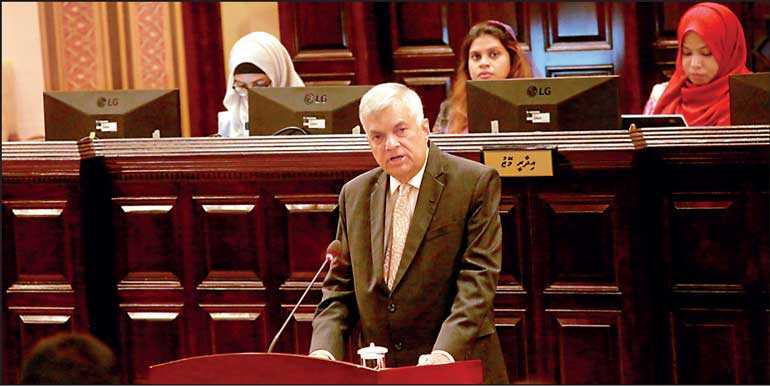Tuesday Feb 17, 2026
Tuesday Feb 17, 2026
Wednesday, 4 September 2019 00:28 - - {{hitsCtrl.values.hits}}

Prime Minister Ranil Wickremesinghe yesterday said he remained committed to abolishing the Executive Presidency so its powers cannot be abused with impunity, and pledged to continue upholding democracy.
Addressing the People’s Majlis, which is the equivalent of the Maldives Parliament, Wickremesinghe outlined the measures taken by his Government, since coming to power in 2015, to foster and promote democracy and strengthen institutions. He acknowledged that the creation of the Executive Presidency led to the accumulation of power in one institution, and this was somewhat resolved by the Government.
“The 19th Amendment to our Constitution corrected the position by requiring the President to appoint Ministers on the advice of the Prime Minister. This reinforced the collective responsibility of the Cabinet of Ministers to Parliament. Today, the major features of the Westminster Parliamentary Government exist side by side with an Executive Presidency, which we are committed to abolish, due to its profound powers that have often been exploited and abused by its incumbents with impunity,” he said.
The Prime Minister said the 19th Amendment was deemed necessary, because of “the flagrant violations of the Constitution under the previous regime. For instance, the then-Chief Justice Shirani Bandaranayake was removed in 2013 without a proper resolution of impeachment. Similarly, there was a high level of politicisation of the Public Service and the Police. The 19th Amendment addressed these issues by establishing six independent commissions.”
However, Wickremesinghe pointed out laws alone do not strengthen democracy, as they can be repealed or ignored. The strengthening of key democratic institutions, and their implementing mechanisms is also necessary, he said. Sri Lanka has achieved the independence of these institutions through the establishment of the Constitutional Council. The appointees were no longer dependent on the whims of the Executive, and have the space to act independently, he added.
“But the challenge is not over. The abuse of the democratic space for example, through hate speech and fake news, are some of the new dangers. Social media is like a god of ancient times: both the creator and the destroyer. It has the ability to spread the message of freedom as well as to rouse passions and emotions that lead to its destruction.”
“Finding a balance between the democratisation of news and the legal obligations of the user to prevent harm is the complex question that which we, you, and many countries, have to grapple with. The final solution will require an educated public, aware of their freedoms and the threats that are posed by the net and the web.”
Wickremesinghe also said that as Sri Lanka and Maldives are two neutral nations situated at the cross roads of the Indian Ocean, they have to face mutual challenges of rising regional tensions, terrorism, piracy, and drug trafficking. He called for the two countries to strengthen bilateral dialogue in this sphere, and seek ways to cooperate in containing and overcoming these threats.